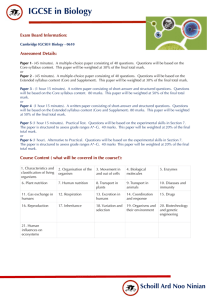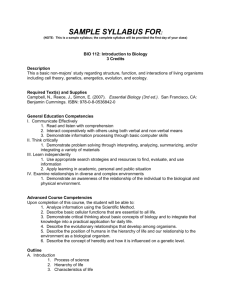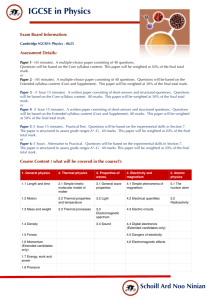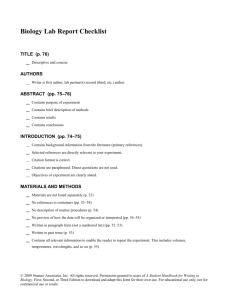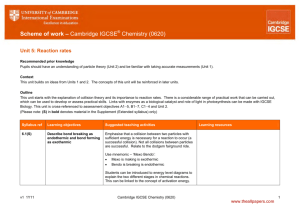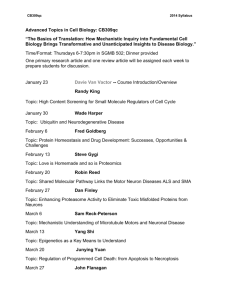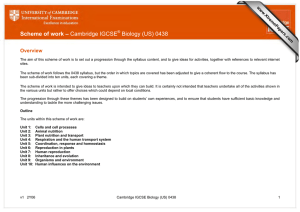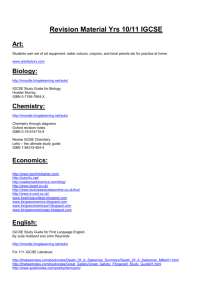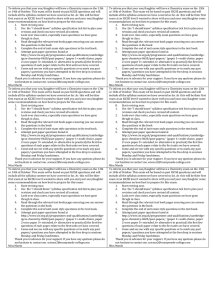iGCSE Course guide for examination 2016-2018
advertisement
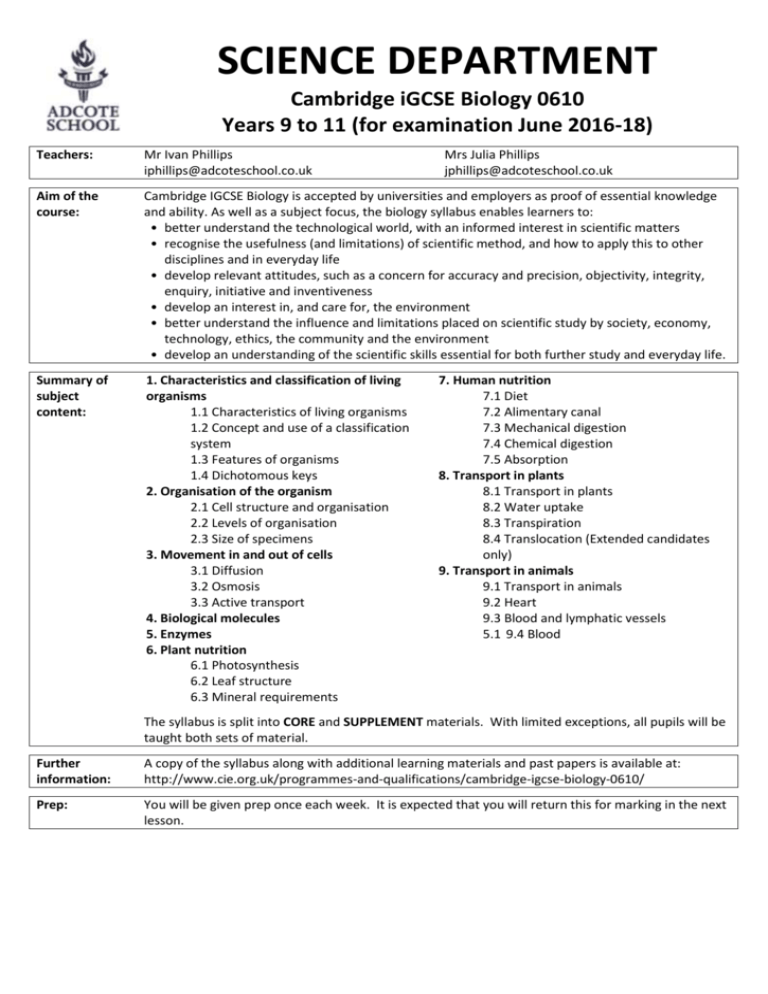
SCIENCE DEPARTMENT Cambridge iGCSE Biology 0610 Years 9 to 11 (for examination June 2016-18) Teachers: Mr Ivan Phillips iphillips@adcoteschool.co.uk Mrs Julia Phillips jphillips@adcoteschool.co.uk Aim of the course: Cambridge IGCSE Biology is accepted by universities and employers as proof of essential knowledge and ability. As well as a subject focus, the biology syllabus enables learners to: • better understand the technological world, with an informed interest in scientific matters • recognise the usefulness (and limitations) of scientific method, and how to apply this to other disciplines and in everyday life • develop relevant attitudes, such as a concern for accuracy and precision, objectivity, integrity, enquiry, initiative and inventiveness • develop an interest in, and care for, the environment • better understand the influence and limitations placed on scientific study by society, economy, technology, ethics, the community and the environment • develop an understanding of the scientific skills essential for both further study and everyday life. Summary of subject content: 1. Characteristics and classification of living organisms 1.1 Characteristics of living organisms 1.2 Concept and use of a classification system 1.3 Features of organisms 1.4 Dichotomous keys 2. Organisation of the organism 2.1 Cell structure and organisation 2.2 Levels of organisation 2.3 Size of specimens 3. Movement in and out of cells 3.1 Diffusion 3.2 Osmosis 3.3 Active transport 4. Biological molecules 5. Enzymes 6. Plant nutrition 6.1 Photosynthesis 6.2 Leaf structure 6.3 Mineral requirements 7. Human nutrition 7.1 Diet 7.2 Alimentary canal 7.3 Mechanical digestion 7.4 Chemical digestion 7.5 Absorption 8. Transport in plants 8.1 Transport in plants 8.2 Water uptake 8.3 Transpiration 8.4 Translocation (Extended candidates only) 9. Transport in animals 9.1 Transport in animals 9.2 Heart 9.3 Blood and lymphatic vessels 5.1 9.4 Blood The syllabus is split into CORE and SUPPLEMENT materials. With limited exceptions, all pupils will be taught both sets of material. Further information: A copy of the syllabus along with additional learning materials and past papers is available at: http://www.cie.org.uk/programmes-and-qualifications/cambridge-igcse-biology-0610/ Prep: You will be given prep once each week. It is expected that you will return this for marking in the next lesson. Assessment: This course is externally assessed at the end of year 11 by public examination. There is no coursework component. Core candidates take: Extended candidates take: Paper 1 45 minutes Paper 2 45 minutes A multiple-choice paper consisting of 40 items of A multiple-choice paper consisting of 40 items of the four-choice type. Questions will be based on the four-choice type. Questions will be based on the Core syllabus content. This paper will be the Extended syllabus content (Core and weighted at 30% of the final total mark Supplement). This paper will be weighted at 30% of the final total mark. and: and: Paper 3 1 hour 15 minutes Paper 4 1 hour 15 minutes A written paper consisting of short-answer and A written paper consisting of short-answer and structured questions. Questions will be based on structured questions. Questions will be based on the Core syllabus content. 80 marks. This paper the Extended syllabus content (Core and will be weighted at 50% of the final total mark. Supplement). 80 marks. This paper will be weighted at 50% of the final total mark. and: Paper 6 1 hour – Alternative to Practical Questions will be based on the experimental skills in Section 7. The paper is structured to assess grade ranges A*–G. 40 marks This paper will be weighted at 20% of the final total mark. *We aim for all pupils to sit paper 3 and access the higher grades, however the decision to enter candidates for papers 2 or 3 will be made based on performance in class, tests and the mock examination. If you need clarification of your level, please talk to your teacher. Extra learning: In order to achieve your full potential in your final iGCSE examinations it is important that you do further study using, at least, books and the internet. Useful websites for this subject include: • http://www.bbc.co.uk/education/subjects/z9ddmp3 • http://biology-igcse.weebly.com/ We will also post useful information on the Public drive at school here: P:/Science help/iGCSE Biology Revision: It is important to revise thoroughly for all your tests and examinations. From February in year 11, the science department also runs additional revision sessions at lunchtimes. Look out for announcements about when these are running. The department also places an order for the following revision guides: Cambridge Biology IGCSE Revision Guide ISBN 9780199152650 CGP IGCSE Biology Exam Practice Workbook ISBN 9781847626905 CGP IGCSE Biology for Edexcel revision guide ISBN 9781847626899 You will be provided with a copy of the course text book to use. If you would like to have one for yourself, here are the details: Biology for Cambridge IGCSE ISBN 9781408500170 If you have a smartphone, iPhone, Android or other compatible device, CGP publishes a useful revision app here: https://apps.cgpbooks.co.uk/home (GCSE level only) Extra support: The science department operates an open door policy. If you are unsure of anything we have learnt or would like further guidance on learning, examinations, revision or science careers, please talk to any of our teachers. Enrichment opportunities: The science department runs a number of additional activities including Science/STEM club (Science, technology, engineering and maths) aimed at further developing practical and applied science. We also encourage the certification of your achievements through the British Science Association CREST Award scheme at Discovery (year 6), Bronze (KS3), Silver (KS4) and Gold (6th form) levels.
